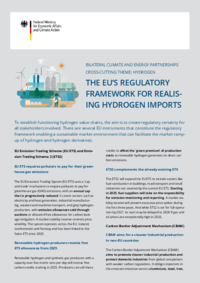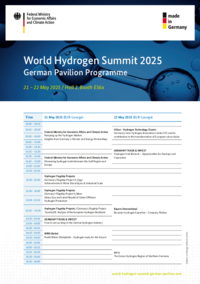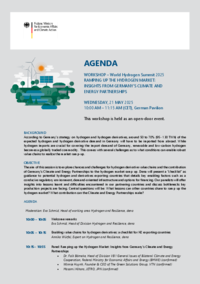Cross-Cutting Topics of our Partnerships
The bilateral Climate and Energy Partnerships, Energy Dialogues, and Hydrogen Partnerships work on a wide range of topics that affect many areas of the economy, politics and society, including carbon management, civil society and tink tanks, communications, digitalisation and protection of critical infrastructure, hydrogen, skilled labour for the global energy transition and start-up ecosystems.
Carbon Management
Carbon capture, utilisation and storage (CCUS) technologies can support the achievement of climate targets in climate and energy partnership (CEP) countries. They also impact industrial value creation and the energy sector and have become a decisive factor for economic competitiveness. In 2024, the cross-cutting theme Carbon Management used participatory approaches to determine the level of knowledge and application of CCUS technologies in partner countries. Workshops were held and a survey was conducted with representatives of the implementing organisations. A qualitative analysis is intended to supplement the cross-national assessment of the status of the application of CCUS technologies. To enhance CCUS expertise in partner countries, efforts also focused on examining German experiences in the area of carbon management, as there have been considerable developments in recent years. Strategies for carbon management and negative emissions are currently being developed. These experiences were summarised in a representative set of slides to facilitate knowledge transfer to partner countries.
Civil Society and Think Tanks
As a societal transformation, a just energy transition can only succeed if all stakeholders actively participate in advancing it. The cross-cutting topic ‘Cooperation with Civil Society and Think Tanks’ aims to enable this process, develop innovative solutions and increase overall acceptance of the energy transition. In 2024, the team organised various activities, including a workshop on civil participation and a qualitative needs analysis in partnership countries. It also identified trending topics, provided relevant data and strengthened specialised networks. Since women are key actors in the energy transition, it boosted their crucial role through country activities and the global Women Energize Women campaign.
Communicating the Energy Transition
Coherent and strategically planned communication is vital to ensure that climate and energy partnerships have a greater impact in our partner countries and in Germany. Targeted media and public relations work helps to build confidence in climate and energy partnerships as a government instrument while also highlighting what has been achieved and gaining and maintaining the interest of key stakeholders. The primary goal of communication in this area is to present complex energy transition issues clearly and understandably. In doing so, the focus is on tailoring content to reflect the different local circumstances and needs of each partner country. At the same time, it is important to keep local populations informed about the issues addressed by climate and energy partnerships in order to create a broad understanding of their international activities and their contribution to the global energy transition. As well as promoting transparency, this approach strengthens awareness of the partnerships and their crucial role.
‘What additional benefits do climate and energy partnerships offer, why are they such an important policy instrument of the German Government, and how exactly do they help to drive the energy transition?’ These are precisely the questions being tackled under the cross-cutting theme ‘Communication’. In this context, however, communication needs to go beyond simply providing information. It is part of a global dialogue on building a sustainable future.
Digitalisation and Protection of Critical Infrastructure
The objective of the cross-cutting theme Digitalisation and Protection of Critical Infrastructure is to support partner countries in advancing the digitalisation and cybersecurity of energy systems. In 2024, the focus was on organising a multinational cybersecurity exercise that brought together participants from four continents. This initiative included a workshop aimed at exploring opportunities for international collaboration to strengthen the cybersecurity of energy systems globally. Looking ahead to 2025, the primary activity will be the establishment of the Alliance for Cybersecurity in Energy Systems, a partnership between Germany, Israel, the United States and Australia. In addition, the Germany Energy Agency (dena) will work to identify the specific interests and challenges faced by each partner country. Based on these findings, a tailored portfolio of products will be developed and made available to implementing organisations and the countries involved to further enhance their energy system security.
Hydrogen
The cross-cutting theme Hydrogen aims to solidify Germany’s role as a global technology leader in green hydrogen, secure imports and support climate protection in partner countries. Proven participatory approaches leverage the knowledge of implementing organisations to foster learning between Germany and its partners. In 2024, the primary focus was on enhancing knowledge exchange, identifying cross-CEP needs and fostering synergies. Looking ahead to 2025, activities will prioritise knowledge sharing among implementing organisations to tackle common hydrogen-related challenges and explore innovative solutions. Insights from these activities will support policy development through comprehensive analyses and briefings with the German Federal Ministry for Economic Affairs and Energy (BMWE). Strategic findings will be shared with the BMWE for policy-making and integrated into dialogues with businesses, civil society and experts.
-

The EU's regulatory framework for realising hydrogen imports
PDF, 216,3 KB
World Hydrogen Summit 2025
-

World Hydrogen Summit 2025 - German Pavilion Programme
PDF, 2,0 MB
-

Workshop "Ramping up the hydrogen market: Insights from Germany's Climate and Energy Partnerships"
PDF, 206,8 KB
Skilled Labour for the Global Energy Transition
For it to be successful, the global energy transition requires skilled people. German companies and their local partners need a skilled workforce to drive sustainable, decarbonised energy systems. Therefore, the cross-cutting theme Skilled Labour for the Global Energy Transition was established for CEPs. A team of experts initiated key actions for its roll-out in 2024 with the aim of coordinating existing strategies and scaling up best practices to enhance skilled labour initiatives. A kick-off meeting with CEP implementing agencies and a roundtable set the stage for collaboration. Subsequent activities currently being carried out include exchanges, workshops, bilateral sessions and a needs assessment across all CEP partner countries
Start-Up Ecosystems
Strengthening energy start-up ecosystems is vital for driving innovation in sustainable energy solutions and accelerating the transition to cleaner, more efficient technologies. These ecosystems foster collaboration, attract investment and create jobs, addressing global energy challenges while advancing the achievement of long-term environmental and economic goals. While specific energy demands and objectives differ from one country to another, supporting innovation in the energy sector remains a universal priority. Start-ups and young innovators operate with a flexibility, creativity and agility that larger corporates and government institutions often cannot match, making it essential to involve them in initiatives in all the energy partnership countries. In 2024, the suggested work packages for the cross-cutting theme focusing on start-up ecosystems included a report showcasing financial instruments and support mechanisms available to energy start-ups and a brief on successful German energy start-ups and best practices that enabled them to develop. They also included a joint workshop with implementing organisations – the Deutsche Gesellschaft für Internationale Zusammenarbeit (GIZ) GmbH, adelphi, Guidehouse and dena – to discuss and establish the most appropriate ways to collaborate and to plan the most relevant and important initiatives to invest in going forward. Looking ahead to 2025, the task force intends to complete the aforementioned report and brief. In addition to these publications, a workshop meeting with the implementing organisations is planned to discuss the creation of a database of energy start-up ecosystems across energy partnerships.
